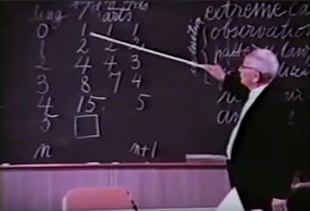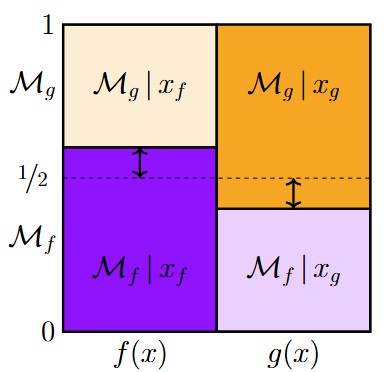One of the famous fallacies in deductive logic is known as “affirming the consequent”. Here is an example of a syllogism gone wrong:
General statement
When Socrates rises early in the morning, he always has a foul mood.
Specific statement
Socrates has a foul mood.
Deduction (invalid)
Socrates has risen early in the morning.
The deduction is invalid because Socrates may also be in a foul mood at other times of the day as well. What the fallacy does is take the general statement “A -> B” (A implies B), and interpret it as “B -> A” (B implies A).
Most real life situations do not demand deductive reasoning. Instead, the much more relevant activity is learning from experience, that is, inductive reasoning. In inductive reasoning, uncertainty is the name of the game. And it is here that “affirming the consequent” is transformed from a fallacy to a law, one that might be called “corroborating the consequent”. In two brilliant books, the mathematician George Polya
“We have here a pattern of plausible inference:
A implies B
B true
____________
A more credible
The horizontal line again stands for “therefore.” We shall call this pattern the fundamental inductive pattern, or, somewhat shorter, the “inductive pattern”.This inductive pattern says nothing surprising. On the contrary, it expresses a belief which no reasonable person seems to doubt: The verification of a consequence renders a conjecture more credible. With a little attention, we can observe countless reasonings in everyday life, in the law courts, in science, etc., which appear to confirm to our pattern.” (Polya, 1954b, pp. 4-5)
Let’s translate this to our earlier example of grumpy Socrates:
General statement
When Socrates rises early in the morning, he always has a foul mood.
Specific statement
Socrates has a foul mood.
Inference (valid?)
It is now more credible than it was before that Socrates has risen early in the morning.
This example actually suggests that Polya’s definition has a small flaw. When the consequent is predictively irrelevant, the credibility of the conjecture ought to remain unaffected. For instance, suppose we know that Socrates was perpetually in a foul mood, irrespective of the time of day; this invalidates the inference above. To drive the point home, here is another example:
General statement
On Mondays, trains from Hilversum to Amsterdam run every 15 minutes.
Specific statement
Today, trains from Hilversum to Amsterdam run every 15 minutes.
Inference (valid?)
It is now more credible than it was before that today is a Monday.
But what if I tell you that trains from Hilversum to Amsterdam run every 15 minutes every day of the week? It becomes clear that the alternative hypotheses (days of the week) also imply the consequent, and the consequent is therefore predictively irrelevant, and the credibility of the proposition is left unchanged.
Polya was a brilliant mathematician who wrote two books about induction — it seems unthinkable that he missed this, particularly as the flaw becomes evident as soon as one applies Bayesian inference rules to the situation. [Disclaimer: we have not yet read Polya’s books cover to cover, so it is possible that he addresses the flaw explicitly somewhere] Perhaps Polya felt that for mathematical propositions, if a conjecture implies a consequence, then the negation of that conjecture does not imply that consequence. In other words, perhaps in mathematical reasoning a predictively irrelevant consequent simply does not occur.
Interestingly, this guess is itself a conjecture and hence subject to a process of inductive corroboration. Indeed, we have tried a few mathematical conjectures and the consequent was never predictively irrelevant. Of course, a single counterexample would, in Polya’s words, “irrevocably explode” our conjecture and demonstrate that, even for mathematical conjectures, Polya’s principle needs to be adjusted.
References
Polya, G. (1954a). Mathematics and plausible reasoning: Vol. I. Induction and analogy in mathematics. Princeton, NJ: Princeton University Press.
Polya, G. (1954b). Mathematics and plausible reasoning: Vol. II. Patterns of plausible inference. Princeton, NJ: Princeton University Press.
About The Authors

Eric-Jan Wagenmakers
Eric-Jan (EJ) Wagenmakers is professor at the Psychological Methods Group at the University of Amsterdam.

Quentin Gronau
Quentin is a PhD candidate at the Psychological Methods Group of the University of Amsterdam.



